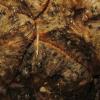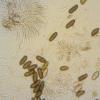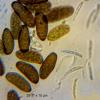
11-02-2026 22:15
 William Slosse
William Slosse
Today, February 11, 2026, we found the following R

11-02-2026 19:28
 Lothar Krieglsteiner
Lothar Krieglsteiner
on small deciduous twig on the ground in forest wi

25-04-2025 17:24
Stefan BlaserHi everybody, This collection was collected by J�

10-02-2026 17:42
 Bernard CLESSE
Bernard CLESSE
Bonjour à toutes et tous,Pourriez-vous me donner

10-02-2026 18:54
Erik Van DijkDoes anyone has an idea what fungus species this m

09-02-2026 20:10
 Lothar Krieglsteiner
Lothar Krieglsteiner
The first 6 tables show surely one species with 2

09-02-2026 14:46
Anna KlosGoedemiddag, Op donderdag 5 februari vonden we ti

02-02-2026 21:46
Margot en Geert VullingsOn a barkless poplar branch, we found hairy discs
Associated with Sphaeropsis sapinea?
Jenny Seawright,
10-03-2015 14:50
 Hello all,
Hello all, I noticed a gelatinous substance on cone scales of Pinus sylvestris, in many (but not all) cases associated with black perithecia.
Spores / conidia from the black perithecia were light brown, simple but some faintly 1-septate, 29-37 x 15 µm - smaller than those suggested by Christian Lechat as Sphaeropsis sapinea in different post, but within the size range for that species?
Conidia from the gelatinous substance were hyaline, c. 24-29 x 3-4 µm. Are these from a different fungus?
With regards,
Jenny
Chris Yeates,
10-03-2015 20:58

Re : Associated with Sphaeropsis sapinea?
Hi Jenny
I would still be happy that that is Sphaeropsis sapinea; I have seen it with two and even on occasion three septa. Regarding your second fungus, although your conidial sizes are at the very top end I would wonder about these being beta-condia of Phomopsis conorum now treated as one of the numerous synonyms of the plurivorous Diaporthe eres; I see this is currently in Species Fungorum under an anamorph name - "One Fungus, One Name" at work here? http://www.speciesfungorum.org/Names/SynSpecies.asp?RecordID=123547
best wishes
Chris
I would still be happy that that is Sphaeropsis sapinea; I have seen it with two and even on occasion three septa. Regarding your second fungus, although your conidial sizes are at the very top end I would wonder about these being beta-condia of Phomopsis conorum now treated as one of the numerous synonyms of the plurivorous Diaporthe eres; I see this is currently in Species Fungorum under an anamorph name - "One Fungus, One Name" at work here? http://www.speciesfungorum.org/Names/SynSpecies.asp?RecordID=123547
best wishes
Chris
Jenny Seawright,
11-03-2015 10:34

Re : Associated with Sphaeropsis sapinea?
Thanks for the reply Chris, and for confirming the Sphaeropsis. I'll try and find some spores and perithecia of Diaporthe eres among it.........
With regards
Jenny
With regards
Jenny
Chris Yeates,
11-03-2015 15:43

Re : Associated with Sphaeropsis sapinea?
Hi Jenny
you won't necessarily be able to find the teleomorph. It is quite common to find Phomopsis spp. on dead twigs, stems, leaves etc., without the accompanying Diaporthe.
After a while recognising Phomopsis alpha*- and ß-conidia is generally quite straightforward - do you have access to the two volumes of British Stem & Leaf Fungi by W.B. Grove?
best wishes
Chris
*system is not letting me enter the Greek letter
you won't necessarily be able to find the teleomorph. It is quite common to find Phomopsis spp. on dead twigs, stems, leaves etc., without the accompanying Diaporthe.
After a while recognising Phomopsis alpha*- and ß-conidia is generally quite straightforward - do you have access to the two volumes of British Stem & Leaf Fungi by W.B. Grove?
best wishes
Chris
*system is not letting me enter the Greek letter
Jenny Seawright,
11-03-2015 19:04

Re : Associated with Sphaeropsis sapinea?
Thanks again Chris, but no, I don't have either volume of Grove's "Stem and Leaf Fungi"
John Plischke,
12-03-2015 00:25
John Plischke,
12-03-2015 00:27

Re : Associated with Sphaeropsis sapinea?
This may work better the first did not take you to the book or download page
http://bibdigital.rjb.csic.es/ing/FichaLibro.php?Libro=5228
Jenny Seawright,
12-03-2015 11:21

Re : Associated with Sphaeropsis sapinea?
Thank you both for your help - it is much appreciated!
With regards,
Jenny
With regards,
Jenny


